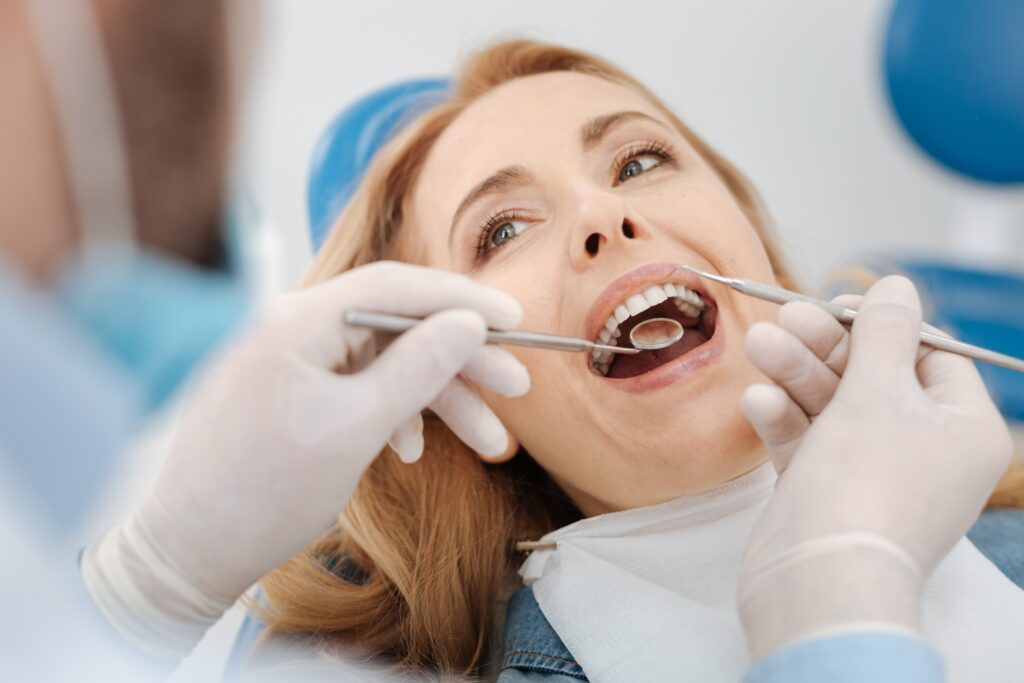Dental Cleanings: Answering Common Questions
Spring is a great time to consider ways to improve your oral health and to schedule your next dental cleaning appointment. Proper oral hygiene requires more than just cleaning your teeth twice a day. You must floss them at least once a day and visit the dentist twice a year.
During these visits, the dentist performs dental exams and cleanings. If you are unclear about what these exams and cleanings entail or why they are essential, continue reading through this simple guide, which answers five common questions about dental cleanings and exams.
But don’t wait until the end of the article, call Smiley Pearls today to schedule your next oral exam and cleaning. In the meantime, let’s brush up on some answers to frequently asked questions about dental exams and cleanings.

Five Common Questions About Dental Cleanings and Exams
Why are Dental Cleanings and Exams Important?
Dental exams and cleanings are essential for protecting oral health. Oral health includes the teeth, gums, and the muscles and bones that allow you to smile, speak, and chew. During your biannual cleaning and exam, the dentist and hygienist will screen for common oral health issues such as tooth decay, gum disease, and oral cancer.
Professional dental cleanings are essential because they can eliminate plaque and tartar buildup that regular brushing and flossing cannot reach. Maintaining buildup free teeth is crucial for preventing tooth decay and gum disease.
What Should I Do to Prepare for a Cleaning?
Here are a few simple things to do to prepare before your next dental appointment:
- Continue your regular brushing and flossing routine between dental visits to keep your smile healthy.
- Before your appointment, be sure to brush your teeth to remove any food particles or debris—this helps ensure a smooth and comfortable experience during your visit.
- Communicate your concerns—If you’re experiencing oral discomfort, sensitivity, or feeling anxious about your visit, don’t hesitate to share this with Dr. Chen. She’s here to help you feel comfortable and can talk through any concerns you may have. For patients who need extra support relaxing, sedation dentistry is also available.
- Medical information: Please remember to inform your dental team if you are taking medication or have any relevant medical information to share.
How Often Should Teeth Be Professionally Cleaned?
The American Dental Association recommends scheduling an oral exam and cleaning every six months to help prevent plaque and tartar buildup. However, your dentist may suggest more frequent visits based on your individual needs. Additional cleanings may be recommended if you have any of the following risk factors:
- History of gum disease
- High cavity risk
- Poor oral hygiene habits
- Tobacco use
- Diabetes
Be sure to discuss your specific oral health needs with your dentist to determine the best care plan for you.
Are Dental Cleanings Painful?
If you’re feeling anxious about discomfort during your dental cleaning, rest assured that the procedure should not be painful. However, some patients may experience mild discomfort in certain situations, such as:
- Poor Oral Health – Inconsistent oral hygiene can lead to gum inflammation, tooth decay, or other signs of oral disease, which may increase sensitivity during the cleaning.
- Extended Time Between Visits – If it’s been longer than six months since your last cleaning, your gums may be more sensitive due to plaque and tartar buildup.
Your comfort is important to us. If you have concerns, don’t hesitate to let us know—we’re here to help make your visit as comfortable as possible.
Tips to Make Your Dental Cleaning More Comfortable:
- If you typically experience pain or sensitivity during dental exams or cleanings, taking an over-the-counter (OTC) pain reliever may help. A dose of 600–800 mg of ibuprofen (such as Advil) taken about one hour before your appointment, and again six hours afterward, can reduce inflammation and ease discomfort. As always, consult your physician or healthcare provider before taking any medication, especially if you have underlying health conditions or are currently taking other medications.
- If you’ve experienced discomfort or sensitivity during previous cleanings, be sure to let your hygienist know. They can provide solutions such as topical anesthetics, prescription rinses, or laser dentistry to help ensure a more comfortable experience. Your comfort is a priority, and the team is here to support you throughout your visit.
- Improve Your Oral Health Habits—As mentioned above, maintaining regular daily hygiene habits is important for developing a healthy mouth and making your professional cleanings more comfortable.
What is the difference between a regular cleaning and a deep cleaning?
The main difference between regular dental cleanings and deep cleanings lies in the level of thoroughness. A regular dental cleaning eliminates surface tartar to maintain tooth cleanliness and prevent cavities and gum disease.
A deep cleaning is a more thorough procedure to eliminate plaque and tartar from the roots of the teeth below the gum line. This procedure may necessitate multiple visits. A dentist will often suggest a deep cleaning, also known as scaling and root planing, when a patient has moderate to severe gum disease.
Has it been longer than 6 months since your last cleaning? It’s time to book your spring dental cleaning!
If you haven’t yet booked your spring dental cleaning and oral exam, now is the perfect time. Don’t wait for discomfort or pain to arise—regular preventive care is key to maintaining a healthy smile. Let the team at Smiley Pearls help you keep your oral health in top condition.

